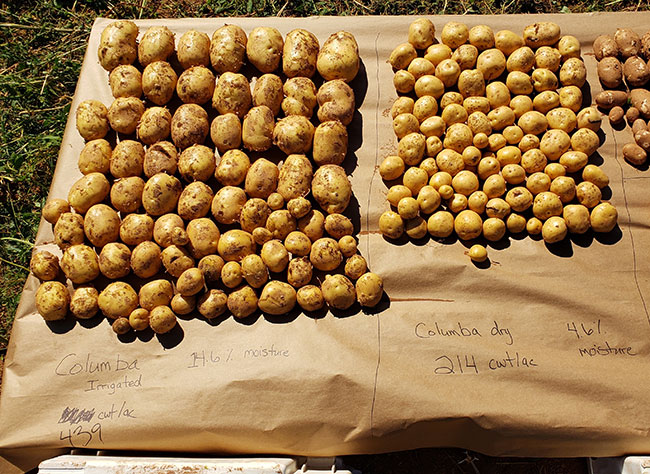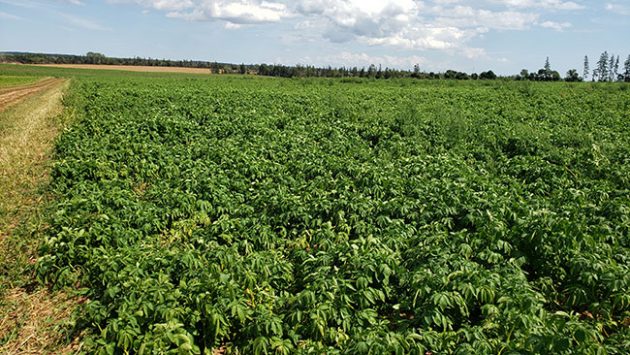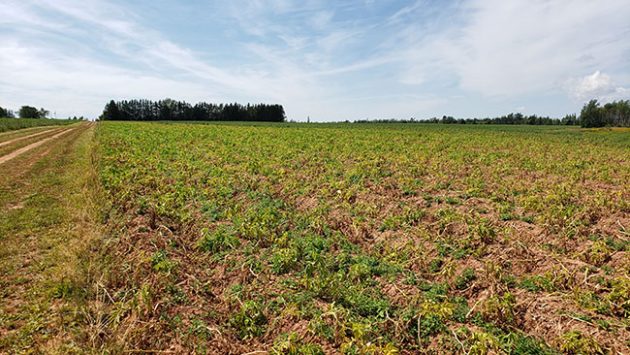
Features
Soil
Technology
The Island’s irrigation woes
Inconsistent rainfall and high temperatures in P.E.I. are putting pressure on the validity of a temporary ban on high capacity irrigation wells that stretched decades.
October 26, 2020 By Madeleine Baerg
 Differences between tubers grown on irrigated land (left) and non-irrigated land (right) on P.E.I. is striking. Photos courtesy of the PEI Potato Board.
Differences between tubers grown on irrigated land (left) and non-irrigated land (right) on P.E.I. is striking. Photos courtesy of the PEI Potato Board.
For more than 250 years, potatoes have been key to life on Prince Edward Island. Today, potato plants fill more farm acres on P.E.I. than in any other Canadian province. In addition to being one of P.E.I.’s primary economic drivers, potatoes are a major part of the Island’s culture. However, a devastating combination of climate change and politically motivated water rights regulation is putting P.E.I.’s potato industry under threat.
“It’s getting to a point where the viability of many family potato farms on P.E.I. is in question. They just don’t think they’ll be able to survive any more. It’s that critical,” says Greg Donald, general manager of the PEI Potato Board.
Back in 2001, a very significant drought event cut potato crop yields by about 35 per cent across the Island. In response, an unusually high number of Island potato producers applied for permits to build new high capacity irrigation wells. The provincial government, concerned by the sudden jump in applications, placed a one-year moratorium on new irrigation well permits in order to have time to make thoughtful, informed decisions about water use. Then politics intervened. Today, nearly two decades after the one-year moratorium was put in place, it remains.
Only approximately six per cent of P.E.I.’s agricultural land is irrigated. In years past, irrigation wasn’t particularly necessary, since P.E.I. is blessed with high annual precipitation. On average, the province receives 46 or more inches of rain each year, about five times as much as Washington State. However, whereas rain used to fall fairly consistently throughout the growing season in decades past, precipitation no longer falls when or how potato crops need it. In recent years, climate change shifted summer weather patterns toward long stretches of drought punctuated by overwhelmingly heavy rain events. In addition, P.EI. now records consistently higher-than-normal summer temperatures, worsening the effects of inconsistent rainfall.
“It’s definitely a trend,” Donald says. “It’s measurable and well-documented. The window where most potatoes are setting tubers and sizing up, that’s when we’re getting less rain and hotter temperatures. When we do get weather, it’s extreme. The interesting thing is that, overall, annual precipitation is actually predicted to slightly increase in P.E.I.; it’s just not coming when we need it.”
“The window where most potatoes are setting tubers and sizing up, that’s when we’re getting less rain and hotter temperatures. When we do get weather, it’s extreme. The interesting thing is that, overall, annual precipitation is actually predicted to slightly increase in P.E.I.; it’s just not coming when we need it.”

An irrigated P.E.I. potato field. Only approximately six per cent of P.E.I.’s agricultural land is irrigated.
Considering current uses
In 2014, P.E.I.’s Department of Environment, Labour and Justice produced a P.E.I. Water Extraction Policy Report that stated total groundwater extraction should not exceed 35 per cent of annual recharge rate. Considering all uses – domestic, industrial (including agriculture), tourism-related, etc. – the Island currently and collectively uses approximately two per cent of their annual recharge rate.
“Of the two per cent of ground water recharge that we currently use, irrigation is only two per cent of the two per cent, or about 0.04 per cent of the collective annual water use on P.E.I.,” Donald explains. “And, about half of that 0.04 per cent is used for watering golf courses. So, we who are in food production are only using a tiny fraction of what science says we can use responsibly.”
Unfortunately, that science isn’t being considered.
In the province’s urban areas, large populations draw from single watersheds. P.E.I.’s largest city Charlottetown outgrew its water infrastructure, leaving water accessibility front-of-mind for many city-dwellers. While watersheds elsewhere on the Island have plenty of water to spare, water usage of any kind anywhere on the Island has become a highly sensitive political issue.
“The politicians won’t support [lifting the moratorium] because the general public is very nervous about water access. Politicians won’t touch the issue with a 10-foot pole and the government – though its own scientists wrote the report saying there’s lots of water available – won’t make any effort to educate because there’s no political will,” Donald says.
“The politicians won’t support [lifting the moratorium] because the general public is very nervous about water access. Politicians won’t touch the issue with a 10-foot pole and the government – though its own scientists wrote the report saying there’s lots of water available – won’t make any effort to educate because there’s no political will,” Donald says.
“I’m in support of science. That’s the long and short of it,” says Mary Robinson, president of the Canadian Federation of Agriculture and proud Prince Edward Islander. “The moratorium was born out of reaction to public pressure that had no footing in science. It’s been stifling for potato farmers to not be able to access our [water] resources in a way that is not going to harm or deplete them but would allow farmers to weather the droughts we’ve been experiencing.”
Irrigation is a topic in #PEI that needs some serious re-evaluation. PEI currently has a moratorium on new irrigation wells which is based on public pressure NOT science. Crops, soil, animals and people are paying the price. (Pic recently posted by a neighbour) #ItsDry https://t.co/lcs5CEQGHu pic.twitter.com/dF9pyx1QZU
— Mary Robinson (@Agproudmary) August 17, 2020
Industry takes a proactive approach
Understandably, P.E.I.’s potato growers are frustrated.
“Our industry supplies the potato needs of over 25 million people. That’s a big responsibility. It’s okay to put in a high capacity well to have green grass in a golf course, but not okay for us to produce food,” Donald says.
P.E.I.’s potato industry is doing all it can to try to stay viable. Producers are replacing conventional plow tillage with higher residue methods that better conserve moisture. Researchers are pushing hard to find new, shorter season, more drought-resistant varieties that also fit the needs of the processing industry. The PEI Potato Board has shifted to put more focus on research and agronomy; in fact, one of its top priorities today is promoting soil health and soil organic matter in order to increase water holding capacity.
“A lot of things are being done to adapt to try and deal with the weather,” Donald says. “We’re asking for access to water not as an alternative to all those efforts, but an addition.”
“A lot of things are being done to adapt to try and deal with the weather,” Donald says. “We’re asking for access to water not as an alternative to all those efforts, but an addition.”
In fact, farmers aren’t even asking for irrigation all the time; they simply want access to water as a back-up plan for when Mother Nature leaves them high and literally dry.
What lays ahead
How long processors can continue operating on P.E.I. is a growing concern.
“With no access to consistent water, I do fear for our ability to remain in the potato production business. I can’t imagine, from a business perspective, that our processors can continue to hang on with such variability of guaranteed product,” Robinson says.
P.E.I.’s agricultural well moratorium is evidence of the growing disconnect between farmers and non-farmers: an issue that is taking different shapes across the country and through every agricultural commodity.
“If we could do a better job building public trust, if we could collaborate as a whole agriculture industry to speak with a unified voice, it wouldn’t just address issues like irrigation on P.E.I., we might do some good work on meat processing, on the growing issue of labour shortage, on so many issues currently pressuring agriculture,” Robinson says.
“If we could do a better job building public trust, if we could collaborate as a whole agriculture industry to speak with a unified voice, it wouldn’t just address issues like irrigation on P.E.I., we might do some good work on meat processing, on the growing issue of labour shortage, on so many issues currently pressuring agriculture,” Robinson says.
Some P.E.I. farmers are advocating for a court to determine the legality of the moratorium. In fact, if farmers were to mount a legal challenge, it’s almost certain the moratorium wouldn’t hold up, Robinson says. But, she adds, “That wouldn’t achieve what we need to achieve. We need people to understand. Ultimately what farmers want is for people to look at the job farmers are doing and be proud of them. To trust them.”
Since scientific arguments and heartfelt pleas have not been heard by the general public, P.E.I.’s farming community hopes to soon gain an opportunity to show rather than tell. P.E.I.’s Federation of Agriculture, which represents most farmers and farm organizations on the Island including the PEI Potato Board, recently submitted a pilot project proposal to the Province. The project, which would be managed by the University of P.E.I. and overseen by the Province’s environmental department and various watershed groups, would install four irrigation wells across P.E.I. to objectively determine whether wells can be used responsibly by agriculture. All results would be fully transparent and available to the public. At the time of publishing, the Province has not yet delivered a decision on the proposal.
The 2020 growing season was particularly challenging for P.E.I. potato producers. Donald predicts yields will be down 20 per cent compared to average. While farmers are renowned for shaking off bad years, Donald isn’t sure P.E.I. potato growers have the mental and emotional will to continue against such defeating odds.
“Farmers are going to lose millions this year. They’re going to have to ask: ‘Do I plant next year? Do I invest hoping it’s going to rain?’”
Print this page
